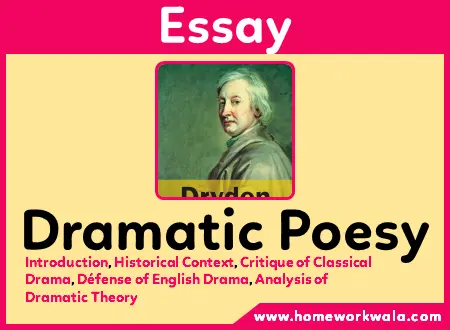Table of Content
Today, In this article we are going to write essay on Dramatic Poesy in English in 600 words.. This article is about Dramatic Poesy.
This post can help the school students who are looking “Dramatic Poesy par nibandh English mein”. We briefing about “Dramatic Poesy in the English” which is very useful for student.
This essay on “Dramatic Poesy” is generally useful for class 7, class 8, class 9 and 10.

Simple essay on Dramatic Poesy in English
Introduction
A dramatic poesy is a form of literature that combines poetic language with drama. It aims to create a theatrical experience that engages the audience emotionally, intellectually, and aesthetically. This essay will discuss the historical context of English drama during the Restoration period, the critique of classical drama, the defense of English drama, and an analysis of dramatic theory. The purpose of this essay is to explore the concept of dramatic poesy and its significance in the development of English literature.
Historical Context
During the Restoration period, English drama underwent significant changes. It was heavily influenced by French drama, which introduced new ideas about dramatic structure, language, and characterization. The Restoration period saw the rise of different types of plays, including comedies, tragedies, and heroic dramas. These plays aimed to entertain the audience while exploring complex themes such as love, revenge, and honor.
One of the main arguments in favor of classical drama was the concept of the three unities of time, place, and action. According to this concept, a play should take place in a single location, within a specific timeframe, and follow a single plotline. However, the advocates of dramatic poesy argued that this approach limited the potential of drama. They believed that a play should have the freedom to explore multiple locations, timelines, and plots.
Another argument in favor of classical drama was the concept of verisimilitude. According to this concept, a play should strive to be realistic and believable. However, the advocates of dramatic poesy argued that verisimilitude could be achieved through the use of poetic language, rather than strict adherence to reality. They believed that poetic language could elevate the emotions and themes of a play, making it more engaging and powerful.
Defense of English Drama
The advocates of dramatic poesy believed that English drama was superior to French drama. They argued that English drama was more natural and closer to life than French drama. They believed that English drama was more capable of exploring the complexities of human nature, while French drama was more concerned with preserving the rules of classical drama. They also believed that English drama had a unique style and character that made it distinct from other forms of drama.
Analysis of Dramatic Theory
The character of Neander in Dryden’s essay represents the views of the advocates of dramatic poesy. He argues that there are three types of dramatic poetry: heroic, dramatic, and lyric. The heroic is characterized by the representation of great men and heroic deeds, while the drama is characterized by the representation of ordinary people and their struggles. The lyric is characterized by the representation of emotions and feelings.
Neander also emphasizes the importance of wit in drama. He argues that it is essential for creating engaging and memorable characters. He believes that it can be used to create characters that are both humorous and serious, and that can engage the audience emotionally and intellectually.
Conclusion
The concept of dramatic poesy was an important development in English literature. It challenged the rules of classical drama and introduced new ideas about dramatic structure, language, and characterization. The advocates of dramatic poesy believed that English drama was superior to French drama and that it had a unique style and character that made it distinct from other forms of drama. The analysis of dramatic theory presented in this essay shows that the concept of dramatic poesy has a lasting significance for English literature and that it continues to inspire new ideas and approaches to drama.
You May Also Like
FAQ about Dramatic Poesy
- What is dramatic poesy?
- What is the purpose of the essay on dramatic poesy?
- What is discussed in the historical context section?
- What is the critique of classical drama?
- What is the defense of English drama?
- What is discussed in the analysis of the dramatic theory section?
- What is the significance of the essay on dramatic poesy for English literature?
A dramatic poesy is a form of literature that combines poetic language with drama.
The purpose of the essay is to explore the concept of dramatic poesy and its significance in the development of English literature.
The historical context section discusses the changes in English drama during the Restoration period and the influence of French drama.
The critique of classical drama argues against the limitations of the three unities and the concept of verisimilitude.
The defense of English drama argues that it is superior to French drama and has a unique style and character.
The analysis of dramatic theory discusses the character of Neander and his views on the different types of dramatic poetry and the importance of wit in drama.
The essay on dramatic poesy challenged the rules of classical drama and introduced new ideas about dramatic structure, language, and characterization, continuing to inspire new ideas and approaches to drama.
We hope you like this post about essay on Dramatic Poesy in English. We are very glad to help the students to do their homework in an effective way. This was a “Dramatic Poesy ka essay English mein”. This type of questions generally asked the students in their schools to write essay on Dramatic Poesy.